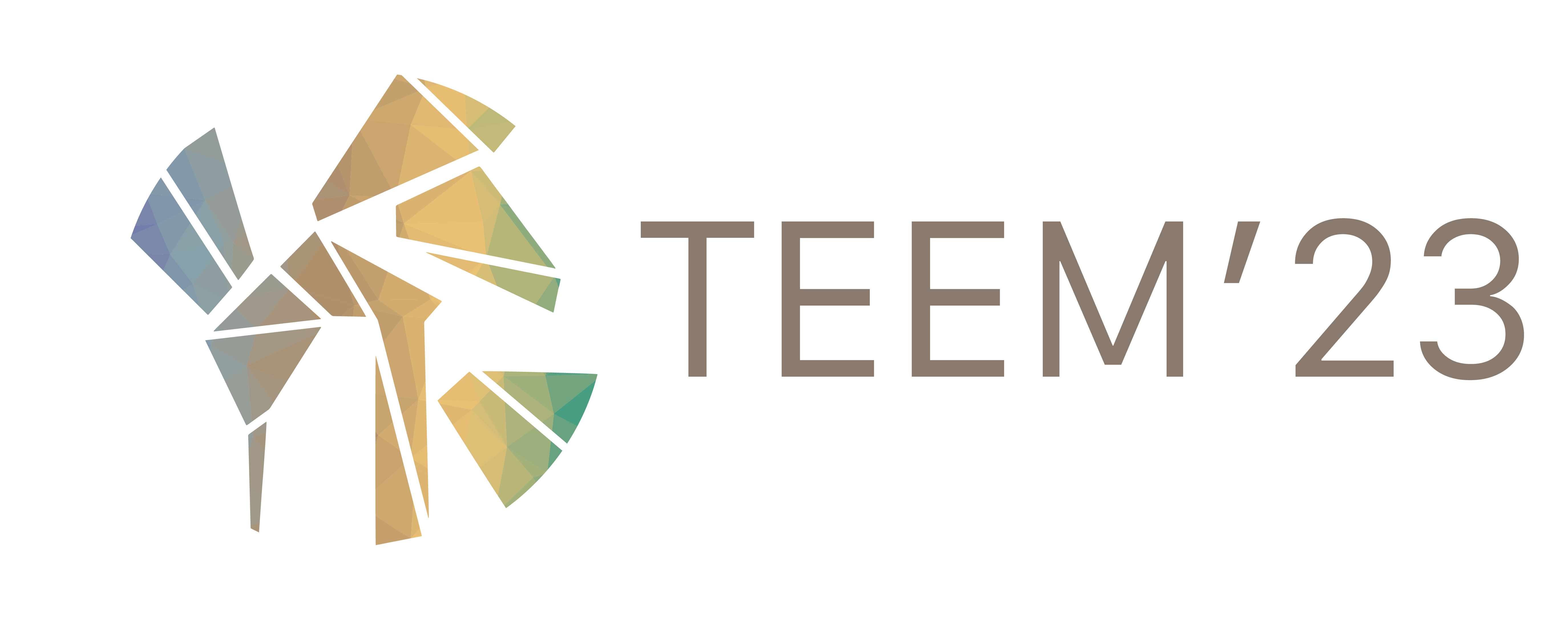9:30
Track 3
Auditorium I
Track 16
Auditorium II
- 7 – Application of digital Video-capillaroscopy in clinical practice and teaching. Rafael Martín Holguera, Juan Antonio De Juanes Mendez, Belen Miguel Ibañez, Olga Martínez González, Manuel Martín Martínez and Ana Isabel Turrión Nieves.
- 11 – Technology development for dynamic learning in virtual reality environments. Juan A. Juanes, Samuel Marcos and Emanuel Sterp Moga.
- 12 – Impact of robot-assisted surgery and 3D vision systems with virtual reality on medical training. Manuela Martín Izquierdo, Marcelo F. Jiménez López and Juan A. Juanes.
- 35 – Major trends in health-centered nursing professional education and complex thinking. Ernesto Pacheco-Velazquez, David Salinas-Navarro and Martina Carlos-Arroyo.
- 39 – Proposal and Definition of a Novel Intelligent System for the Diagnosis of Bipolar Disorder based on the use of Quick Response codes containing Single Nucleotide Polymorphism data. Alberto Pinheira, Manuel Casal-Guisande, Alberto Comesaña-Campos, Inês Dutra, Camila Nascimento and Jorge Cerqueiro-Pequeño.
- 46 – Degree of satisfaction of nursing students with the flipped classroom methodology in simulation scenarios. Jose Carlos Lopez Garcia, Azucena Gonzalez Sanz, Belen Garcia Sanchez, Maria Jose Fermoso Palmero, Carmen Villar Bustos and Elena Sutil Rodriguez.
- 54 – Updating the Anatomical Understanding of Carpal Tunnel using State-of-the-Art Imaging Techniques. Claudia Llamas, Juan Antonio Juanes, David Puertas, Raúl Juárez and José Ángel Santos.
- 67 – Optimizing Data Entry Management in Healthcare: Leveraging HCI to Enhance Medical Decision Accuracy. Ali Azadi and Francisco José García-Peñalvo.
- 95 – Design and Development of an Intelligent Decision Support System applied to the Diagnosis of Patients Susceptible to Heart Failure. Antía Álvarez-Pazó, Laura Ceide-Sandoval, Manuel Casal-Guisande, José-Benito Bouza-Rodríguez, Alberto Comesaña-Campos and Jorge Cerqueiro-Pequeño.
- 96 – Use of Intuitionistic Fuzzy Numbers to Prioritize Patients Suspected of Obstructive Sleep Apnea on the Cardiorespiratory Polygraphy Waiting List – A Novel Multi-Criteria Approach. Laura Ceide-Sandoval, Antía Álvarez-Pazó, Manuel Casal-Guisande, María Torres-Durán, Mar Mosteiro-Añón, Alberto Comesaña-Campos, José-Benito Bouza-Rodríguez, Alberto Fernández-Villar and Jorge Cerqueiro-Pequeño.
- 112 – Comparative Study on the Performance of an Ultra-sonic Sensor and a Laser Sensor for Detecting Obstacles of Different Materials in an Assistive Navigation Application for Visually Impaired Individuals. Florasela Fernandez Victoria, Belen Diego Curto and Vidal Moreno Rodilla.
- 123 – Clinical competence acquired through digital and face-to-face courses during the COVID-19 pandemic in Dentistry. Sonia Perez Suarez, Angeles Dominguez, Ana Zavala Parrales and Enrique Cavazos Lopez.
- 126 – Semantic web in health: What is the goal to contribute to the complexity? Luis Clemente Jiménez-Botello, Gloria Concepción Tenorio-Sepúlveda and Maria Soledad Ramírez-Montoya.
- 133 – Design and prototyping of personalised in-ear headphones with advanced digital methodologies. Fernando Blaya Haro, Juan Ortega Corredor, Roberto D’Amato and Juan Antonio Juanes Méndez.
- 141 – Models, Metamodels and Transformations for Medical Informatics Ecosystems. Félix Buendía-García, Joaquín Gayoso-Cabada, Jaime González-Díaz, Sergio Guinez-Molinos and José Luis Sierra-Rodríguez.
- 159 – Management and application of AI to DICOM image processing: A systematic mapping literature review. Rubén Fraile-Sanchón, Andrea Vázquez-Ingelmo, Francisco José García-Peñalvo and Alicia García-Holgado.
- 171 – Getting to know me: Web application for mood screening in infants. Cleofe Alvites-Huamani, Melba Stanziola and John Rojas-Montero.
- 25 – Defying ageist stereotypes – elders as TV News content producers the case of Senior TV. Luís Miguel Pato, Cristóvão Margarido, Ricardo Pocinho and Patrícia Fíncias.
- 26 – Chords and Scales applications: a case study towards the application in music education and technology. Patricia García-Iasci, Javier Merchán Sánchez-Jara and Sara González Gutiérrez.
- 47 – How is happiness measured? Eustasio Pérez Salido, Araceli Queiruga-Dios and Marián Queiruga-Dios.
- 71 – Design, validation, and implementation of a competency-based training program on artificial intelligence for primary education teachers.Celeste Garcia Delgado, Ana María Pinto Llorente and Maria Teresa Del Moral Marcos.
- 75 – Online training music performance skills based on Tatar Culture East-West dichotomous approach. Svetlana Karkina, Juanjo Mena, Roza Valeeva and Manpreet Kaur.
- 94 – Augmented Reality as a driver to enhance engagement in high school students. Davis Velarde-Camaqui and Jorge Sanabria-Z.
- 98 – Development of vocations in engineering in secondary schools in Portugal. Paulo Silva, Alicia García-Holgado and Manuel Felgueiras.
- 100 – Victims of enforced disappearance in digital press narratives in Colombia and Mexico. Héctor Miguel Rosero-Flórez, María Marcos-Ramos and Teresa Martín-García.
- 103 – Traditional informal didactics and current formalization pathways in the field of Jazz music technological educational settings. Juan-Manuel Cantos-Ruiz, Javier Merchán Sánchez-Jara and Sara González Gutiérrez.
- 135 – Breaking Barriers: Empowering Women’s Leadership in Industry in Biobío, Chile. Lilian San-Martín, Alicia García-Holgado and Angeles Dominguez.
- 158 – A comparative study in Europe to measure the Impact of Government policies, Industry on Public Perception of Renewable Energy. Khuloud Kalthoum, Carlos Felgueiras and Alicia García-Holgado.
- 163 – Communication and interactivity in education a process for Knowledge Management. Olga Najar Sanchez and Erla Mariela Morales Morgado.
- 165 – Multilevel Predictive Model of Academic Performance in Mathematics of 15 year old students in Ecuador: A study based on PISA-D 2018. Tannya Andreina Tene-Tenempaguay, Fernando Martínez-Abad and Juan Pablo Hernández-Ramos.
- 173 – Designing active learning experiences at remote: conscious remote education.Hugo Alexander Rozo García and María Soledad Ramírez Montoya.
- 175 – Empowering the development of higher education counselors teacher: Innovative training strategies to strengthen competency in student mentoring. Alba Caterine Alves Noreña, María José Rodriguez Conde and Juan Pablo Hernández Ramos.
- 53 – The university mentor. Formative model of how to accompany the university student. Susana García Cardo, Araceli Queiruga-Dios and Marián Queiruga-Dios.
- 69 – Multi-Dimensional Mentoring Framework within the context of PhD students of the Doctorate Program of Formation in the Knowledge Society of the University of Salamanca. Harold Tinoco-Giraldo, Alba Catherine Alves-Noreña, Alejandra Carina Santos and Maria Serena Rivetta.
12:00
Coffee Break
12:30
Closing Ceremony
- Award ceremony
- Closing speakers
